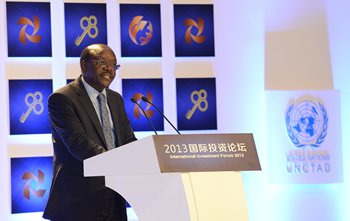UNCTAD Secretary-General Mukhisa Kituyi warned Sunday that the road to global investment recovery remains bumpy, with investors reluctant to expand their businesses in the face of widespread economic fragility and policy uncertainty. According to the UNCTAD World Investment Report, global foreign direct investment (FDI) in 2012 contracted by 18 per cent.
UNCTAD Secretary-General Mukhisa Kituyi delivers keynote address at International Investment Forum, Xiamen, China |
Dr. Kituyi spoke before the International Investment Forum (IIF) of the 17th China International Fair for Investment and Trade (CIFIT), which is taking place in Xiamen this week.
The visit to China was the Secretary-General's first trip since he assumed his post on 1 September, and on the margins of the conference he held bilateral meetings with the Vice Premier of China, Ma Kai, and with government ministers from several other countries.
He and Mr. Ma voiced support for continued cooperation on development issues and spoke of the potential for future joint work over a wide range of areas, including technical assistance to least developed countries.
In his keynote speech to the IIF, Dr. Kituyi said skittishness about the investment environment means that US$6 trillion remains idle on corporate balance sheets.
"This is capital, I am sure you will agree with me, that we would rather see invested in productive capacity to spur economic activity that can help propel us out of economic sluggishness and thereby get more people back into jobs," Dr. Kituyi said. Countries should strive to provide policy certainty to get investment flowing again, he told the conference. "There is a need to boost investor confidence."
Dr. Kituyi noted that despite the gloomy investment outlook, there have been positive developments. He pointed out that in 2012, developing countries, for the first time ever, attracted more foreign direct investment (FDI) than developed countries, receiving 52 per cent of total FDI flows. These flows were important, as they can help stimulate technology and skills transfers and create employment. It is imperative to steer such investment towards sustainable development outcomes, the Secretary-General said.
Dr. Kituyi highlighted the vast potential for development gains that can be reaped from participation in global value chains (GVCs), the hopscotch process by which raw materials now travel from country to country as they are upgraded into finished products. He said developing nations may reap advances from such value chains, notably in the form of job creation and enhanced productive capacity. This could aid them in catching up economically and could raise income levels. However, he also cited potential risks associated with GVC integration, and cautioned that countries should carefully coordinate investment, trade, and related policies with their development strategies to ensure optimum benefits from GVC participation.
Many developing countries are already strong participants in global production networks. Developing countries' share in global value-added trade has grown to 40 per cent today from 20 per cent in 1990, Dr. Kituyi said.
The IIF, CIFIT's main high-level event, was jointly organized by the Ministry of Commerce of China and UNCTAD. The IIF's topic for 2013 was "global value chains and development," and UNCTAD's World Investment Report 2013 served as Forum document, which was extensively cited by speakers.
In addition to meeting with Vice Premier Ma while at the Forum, the Secretary-General held consultations with Marco Hausiku, Deputy Prime Minister of Namibia; Anabel González, Minister of Foreign Trade of Costa Rica; and Rob Davies, Minister of Industry and Trade of South Africa.
These officials expressed concern about uncertainties facing the world economy and the implications the situation has for developing countries. Among their biggest concerns were constraints on such countries' capacities to cope with development challenges and the need to formulate new development strategies and to enhance South-South cooperation. They emphasized the importance of international support, and reiterated their appreciation for UNCTAD's efforts to build international consensus and to help developing countries cope with these emerging challenges. Deputy Prime Minister Hausiku said he hopes that UNCTAD, as an intergovernmental mechanism, can help boost cooperation between sub-regional economic arrangements, for example between the Southern African Development Community (SADC) and the East African Community (EAC), and can help nurture regional value chains, especially when countries within a region cannot participate effectively in global chains.
Dr. Kituyi said he will make a special effort to engage member States through extensive and regular consultations with ambassadors in Geneva.
In the meeting with Dr. Kituyi, Ghazi Abu Nahl, Board Chairman of the World Trade Centers Association, stressed the potential for cooperation between the two organizations, and said he hopes UNCTAD will strive to help more African countries join the World Trade Centers network and hence benefit from trade and investment promotion. Dr. Kituyi drew attention to potential synergies between the two organizations in promoting dialogue between the public and the private sectors with the aim of promoting trade and investment for sustainable development.
During the Secretary-General's meeting with China's Vice Premier, Mr. Ma, the Vice Premier encouraged UNCTAD to continue its role in facilitating South-South cooperation and South-North dialogue on trade- and investment-related development issues. He said UNCTAD serves as an important multilateral platform for investment policy coordination, and encouraged UNCTAD to play a more active part in assisting developing countries in their economic development endeavors. Dr. Kituyi reiterated UNCTAD's commitment to making trade and investment work for sustainable development and commended China's contribution to the world development agenda.
In interviews with China Central Television (CCTV), Sina Network, and Xiamen TV, Dr. Kituyi called for effective global coordination and cooperation on macroeconomic policies that address the special needs and concerns of developing countries.
CIFIT 2013 attracted 1,470 firms and 120 senior officials, including over 50 Government ministers from 130 countries.




